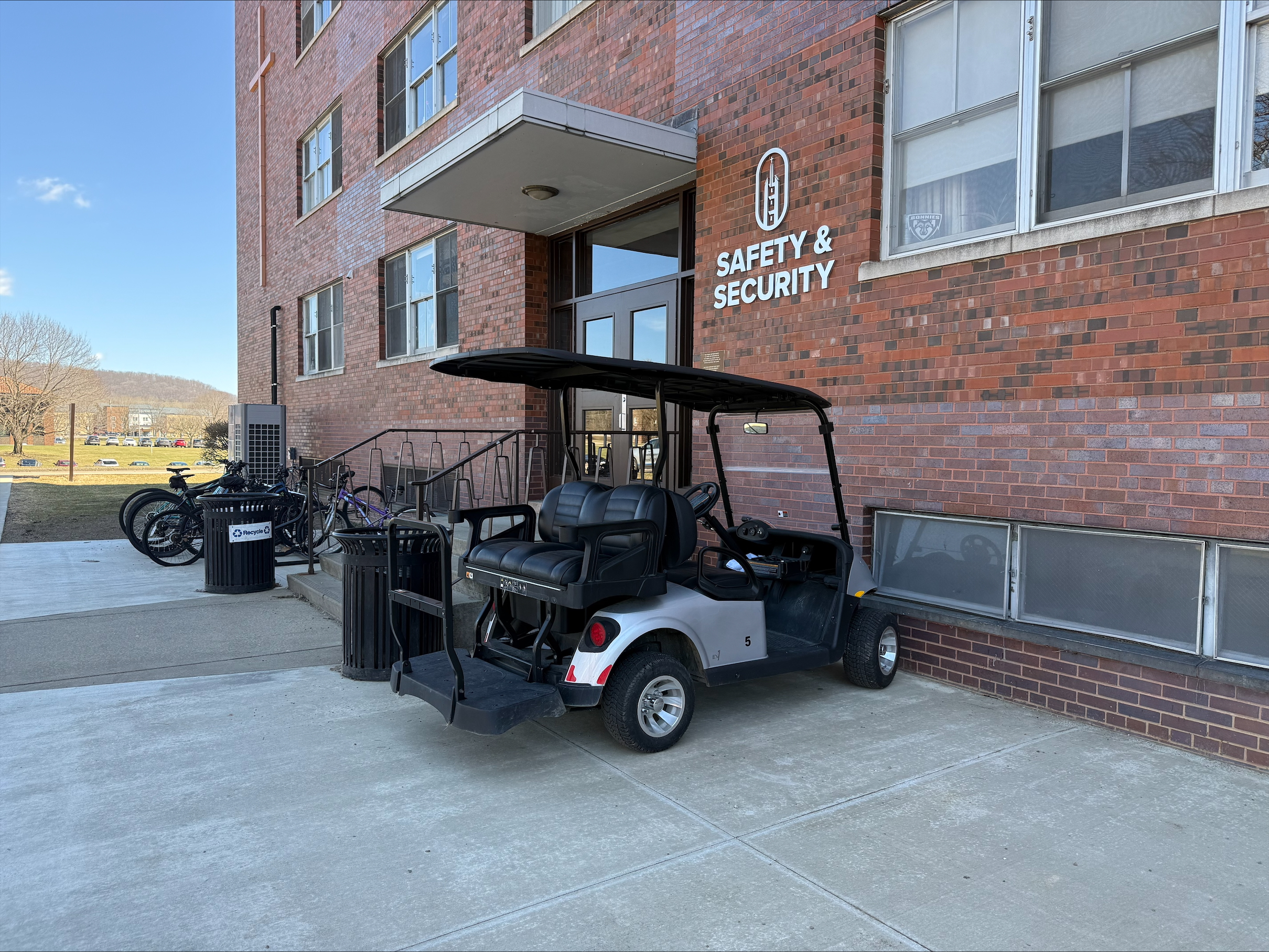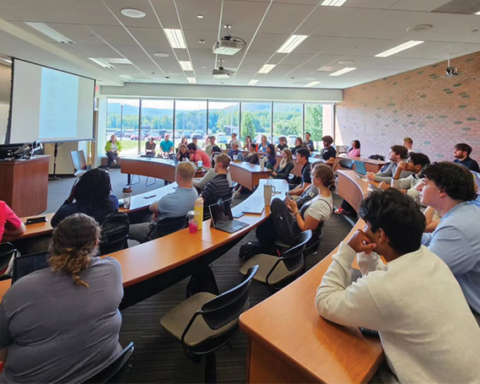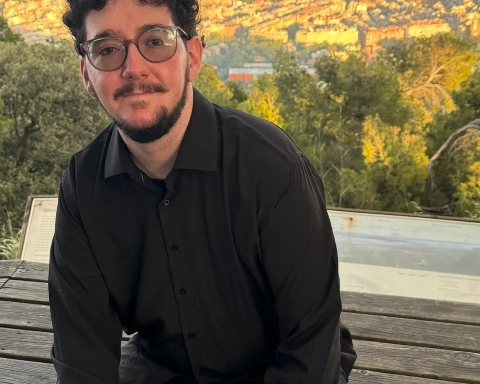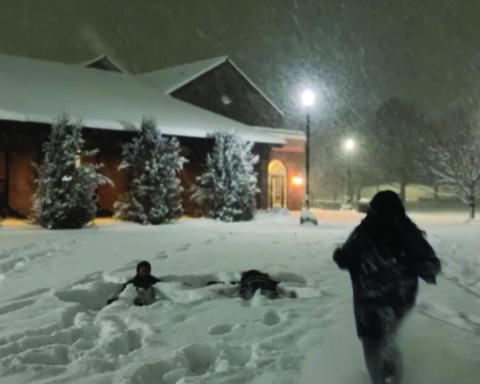Jim Walsh, ’70, returned to campus a few weeks late for Alumni Weekend. Instead, the former congressman came as a delegate for Congress to Campus, along with fellow retired congressman Richard Stallings of Idaho.
The Congress to Campus program brings former members of Congress to college campuses to discuss globalization and the involvement of youth in politics. The pair also addressed the upcoming presidential elections.
They spoke to classes, held a plenary in the Rigas Theater of the Regina A. Quick Center for the Arts and spoke to members of campus media as part of the program. Walsh, separately from Stallings, held a lunchtime forum Tuesday regarding his role in the Northern Ireland Peace Accords. Both Stallings and Walsh cited their experiences with international service in their discussions.
Walsh and Stallings both spent two years post-graduation working abroad as volunteers. Stallings, a member of the Church of Jesus Christ of Latter-day Saints, did his mission work in New Zealand, while Walsh spent two years with the Peace Corps in Nepal.
“If you could go into the streets of Wellington, New Zealand, or Auckland, New Zealand, and talk to people, you can really do just about anything,” Stallings said of his work abroad. “It was a growing experience for me; it gave me confidence; it gave me some direction in my life.”
He also noted that New Zealand at the time operated under a much more socialistic system of government than the United States did, which gave him a look at a liberal economic policy.
Walsh said his time in Nepal gave him confidence and a deeper worldview.
“I understood fully what was important to me and what wasn’t important to me. It really tested me,” he said.
He compared working in the Peace Corps to skiing a double black diamond, the most difficult type of ski slope.
“Once you ski a double black diamond, you can do anything,” he said.
The pair concurred that working abroad gave them a greater love for the United States.
“You work overseas and see how other people operate, and you come home and say, ‘Wow, I’m pretty fortunate,’” Stallings said.
Both Walsh and Stallings said they were interested in politics long before they got involved in Congress.
For Walsh, his drive for public service came from his father, who had worked as the commissioner of Onondaga County, mayor of Syracuse and as the congressman for New York’s 33rd district during Walsh’s youth and young adulthood. He said when he returned to Syracuse from Nepal and settled down, he began to notice that improvements were needed in the city of Syracuse.
“I saw trash collection I thought they made a mess of, and they didn’t really clean out the sewer grates, so we had flooding on some of the streets, and you know, I just didn’t think it wasn’t being done right. So that’s what got me to take the step” toward dedicating his own life to politics, he said.
Stallings said his first foray into politics came with his first congressional run in 1984.
“The incumbent congressman got himself in all sorts of legal problems and was finally convicted of four felonies, so I thought, ‘take him on.’ I had nothing to lose except maybe a little dignity,” he said. “Idaho’s a really Republican state, but I thought, ‘I’m running against a felon, so surely there’s a balance there.’”
Stallings ended up winning the election by a margin of 177 votes. Approximately 200,000 people voted in the election. He was popular enough in his time in Congress, though, to be the third-highest delegate winner in the 1988 Democratic National Convention, behind Michael Dukakis and Jesse Jackson.
Stallings described the experience as “mind-boggling.”
He said that the National Conventions can be “mind-numbing,” but at this particular convention, “They got to Minnesota, and they’re talking, ‘The great state of Minnesota, with ten gazillion lakes and on and on and on, passed so many votes for Michael Dukakis, so many votes for Jesse Jackson… and three votes for Congressman Richard Stallings.’ And I said, ‘What?’ I had no idea it was coming.”
Stallings explained that the delegates who casted votes for him were pro-life Democrats like himself, but that there were several other pro-life Democrats to choose from.
“Why they selected me, I have no idea. I was highly flattered,” he said, noting that he is sometimes still called out for it. “It’s now become a trivia question: ‘Who came in third at the Democratic National Convention in ’88?’ It was a fun moment.”
Though Walsh was never an unplanned presidential candidate, he did help restore peace in Northern Ireland in the late 1990s through the Northern Ireland Peace Accords.
“It’s an exercise that doesn’t come along every day: to get people who have been fighting for hundreds of years to bury the hatchet and find a way to work together and do it all through negotiation,” Walsh said of drafting peace negotiations between Irish republicans interested in keeping Ireland separate from the United Kingdom and unionists who wanted to be absorbed by the United Kingdom.
He noted that his time at Bonaventure had a role in his interest of peace.
“St. Bonaventure and the Franciscans are passive, you know. There’s a prayer they always said after class or at Mass, ‘Make me an instrument of your peace,’ and it always struck me that that would be sort of the ideal, if I could get involved in (peacemaking),” Walsh said.
He said that he spent 36 hours in Ireland during his first time involved in peace talks and didn’t sleep at all.
“I couldn’t sleep,” he said. “I wanted to take it all in, and I was hooked. I went back and forth again probably 20 or 25 times.”
Even though his Congressional career has ended, Walsh hasn’t given up pursuing his love of Ireland and is a member of multiple boards promoting Irish-United States relations.
While both men are retired, they are still concerned for the future of the nation, especially considering the current state of affairs regarding the presidential election.
Mr. Stallings said he thinks the Republican nominee will be Trump, but said he hopes “we won’t have to deal with Trump, because he’s an evil man.”
Walsh said that people like John Kasich (an old friend of his), are falling behind because America is fascinated with fame.
“We have this ‘cult of celebrity’ in this country, which is what makes Trump attractive to a lot of people,” he said. “He’s a TV guy and Kasich isn’t.”
He noted that the other two Republican candidates, Rubio and Cruz, are inexperienced, or in Cruz’s case, even untrustworthy.
“It’s a really messy, nasty, ugly process, but it usually works, so we’ll see. I’m just hopeful Trump will be denied 50 percent (of delegate votes).”
Stallings said he finds it difficult to understand the anger in the Republican Party that fuels the candidacy of Donald Trump, though he said some of it seems to be fueled by racism and the average old age of the party.
“A lot of the Republican Party is backed by people who look like me — white-haired, funny looking, walking with a bit of a limp — which is not good for the future of the party, because you know what my generation’s doing? It’s dying, and it’s only a matter of time that the demographic right now that votes more heavily (Republican) won’t be around,” he said.
He also noted that Hillary Clinton would not have been his first choice of Democratic presidential candidates, citing Joe Biden as a better option, even though he chose not to run.
“(Biden’s) one of the most decent guys in our nation, I think he’s above reproach,” Stallings said. “But that’s not the way the system works. The system works to those who step forward.”
Both Stallings and Walsh agreed that young people have to step forward and become involved in politics for the good of their country.
“The reason we’re (at Bonaventure) is because we’re retired members of Congress who really believe in the country and believe in the process,” Walsh said. “We want young people to know that it’s worth their involvement.”
He said students can get involved in many different ways, including running for office, interning with congressmen or other representatives and getting involved with College Democrats or Republicans, among others.
“You can’t keep this thing going for another 200 years unless the next generation picks up the baton and completes the race… we’re really concerned about the future of the country and the involvement of young people, so that’s why (Stallings and I) came out,” he said.
Stallings added that many countries require some sort of service of their youth, and that the youth in the United States should think of that and help out their country in any way they can.
“We need to give something back to the system,” Stallings said. “We need to be engaged in the promotion of ideals that we hold dear, and we can’t do that while we’re sitting on our butts texting… There’s a lot more important things in life than that, and I just wish people would look at what’s really important and try and make (the world) better.”






